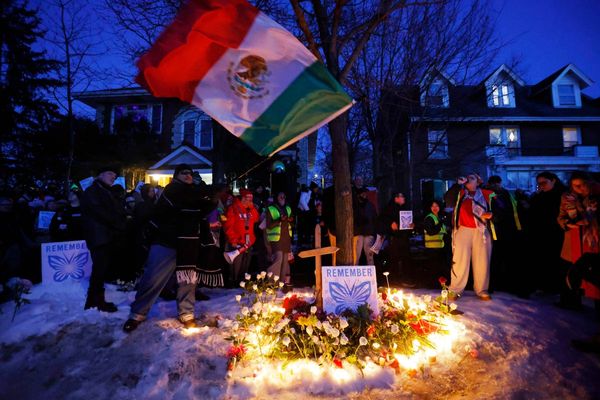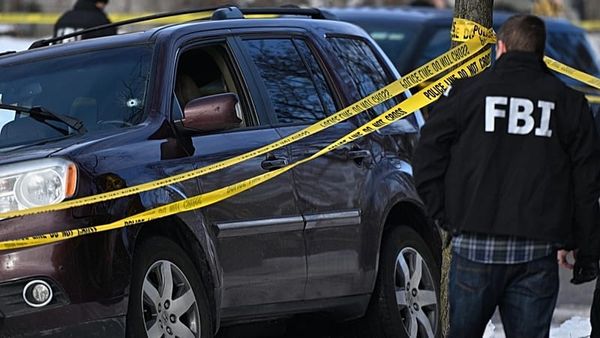
Father Maurizio Patriciello is running late. “I’m waiting for my bodyguards,” he says by text message.
He is neither a celebrity nor a politician but a parish priest in Caivano, a desolate, crime-ridden town on the outskirts of Naples. He has been living under police protection ever since a bomb, accompanied by the message “get out of our way”, exploded by the gate of his church.
The threat was the Camorra’s response to Patriciello’s unrelenting battle against the mafia organisation’s illegal dumping of toxic waste across farmland in the Campania region of southern Italy.
Despite the intimidation, Patriciello did not cave in. Instead, he persevered with his mission: to fight crime and delinquency in a poor community that until last summer had long been neglected by the state.
Patriciello eventually arrives, with his two bodyguards, at San Paolo Apostolo church and settles on a pew by the altar, which is bedecked with a huge nativity scene. Nervously, he describes life in Caivano, where some of his parishioners have unwittingly become drug mules for the mafia.

“They get paid €50 to deliver a package, and the response is always: ‘This way my children eat,’” he says. “These abandoned districts – like the banlieues of Paris – are deliberately planned and wanted. It is a way of distancing the poor. Then a ghetto forms, a closed-off society that creates its own language, its own way of existing, and its own underground economy. Unless something really bad happens, the state ignores it. In Caivano, something bad did happen and the state took notice.”
Caivano, created in 1980 as what was intended to be a temporary home for thousands of people made homeless by the devastating Irpinia earthquake, was put under the spotlight in August after the alleged repeated gang rapes of two girls aged nine and 11.
The girls, who are cousins, were allegedly abused by a group of 15, 13 of them boys. Two of the suspects are the sons of alleged mafia bosses. Some of the alleged rapes took place in an abandoned sports complex in Parco Verde, an area in Caivano considered to be the most prominent in Europe for drug dealing. The crimes allegedly continued for months, coming to light only because videos of the rapes were shared online and eventually ended up with the police.
“The girls were not raped by a paedophile in his 50s; they were raped by a group of boys – children like themselves … and it did not happen just once: this violence occurred for months,” says Patriciello.
Knowing he was risking the wrath of the crime gangs ruling the neighbourhood, the priest once again put his head over the parapet and wrote to Italy’s prime minister, Giorgia Meloni.

Four days later, Meloni visited Caivano and put in motion a police operation involving hundreds of officers, who raided hideouts stashed with drugs, money and weapons linked to the Camorra, including an apartment containing an illegal puppy farm and cages filled with exotic animals.
The initiative marked the first stage of what Meloni described as her rightwing government’s quest to “make citizens feel the state’s presence”.
“Her quick response left me really stunned,” says Patriciello. “I had met [the former prime ministers] Matteo Renzi and Giuseppe Conte, but the difference with Meloni is that she really took the situation in hand.”
Caivano has since become the government’s template for its pledge to rescue Italy’s long-deprived neighbourhoods. Police numbers in the town have significantly increased, with three safety commissioners tasked with overseeing the district’s rehabilitation. The local council was dissolved and 18 people arrested for alleged mafia infiltration and corruption. Work to revive the sports centre has begun after the government unlocked €30m (£25m) in funding.
A controversial law was also passed, named after Caivano, making it easier to arrest and imprison children as young as 14. Elly Schlein, the leader of the centre-left opposition Democratic party, has criticised the law for focusing too much on “repression” and not enough on prevention.

Patriciello is impressed by Meloni’s approach and apparent commitment, but says much more needs to be done than putting more police on the streets.
“Not even a packet of drugs has been dealt, as the streets are being tightly patrolled,” he says. “However, this alone is not enough to resolve the problems here – for example, social services exist on paper, less so in reality. We have three social workers but need at least 20 for such a vast and complex place.”
Another big issue blighting Caivano is the high number of cancer deaths. The town is in the heart of the so-called “Land of Fires”, the area in Campania where the mafia has dumped and burned toxic waste. In early 2021, Italy’s higher health institute confirmed a link between the toxic waste and high cancer rates. The fires have subsided, says Patriciello, but the long-term effects on the community’s health have been stark.
“The last few funerals I have done have all been deaths from tumours, including my nephew,” he says. Patriciello’s sister-in-law also died of cancer last year. “Not long ago, I did the funeral of a woman whose daughter was in the front pew wearing a headscarf. I looked at the coffin and knew that within a year I would be doing her daughter’s funeral too. She died the other day.”
Good things happen in Caivano, too, the priest says, such as the recent graduation of a sociology student – although the fact that this was news speaks volumes about the state of education locally. “This would be normal for a girl in Milan or Venice, but for us it isn’t. But when a good thing happens here, it is worth a thousand times more than when it happens elsewhere.”
It is common for the mafia to retreat when security is tightened in its strongholds, with clans waiting for the state to shift its focus elsewhere before resuming business.
Caivano’s problems are deeply entrenched, but Patriciello is hopeful that the events of recent months can usher in a brighter future.
“Caivano has become a symbol,” he says. “But it could also now be a guiding light for all marginalised societies in Italy.”







